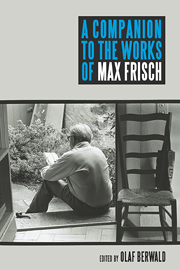Book contents
- Frontmatter
- Contents
- Acknowledgments
- Note on the Abbreviations
- Introduction: Max Frisch in the Twenty-First Century
- 1 Max Frisch's Early Plays
- 2 Spielraum in Max Frisch's Graf Öderland and Don Juan: Transparency as Mode of Performance
- 3 Max Frisch's Biedermann und die Brandstifter and Die große Wut des Philipp Hotz
- 4 Max Frisch's Andorra: Balancing Act between Pattern and Particular
- 5 Eternal Recurrence in Life and Death in Max Frisch's Late Plays
- 6 Max Frisch's Early Fiction
- 7 From Life to Literature: Max Frisch's Tagebücher
- 8 “Writing in order to be a stranger to oneself”: Max Frisch's Stiller
- 9 Cybernetic Flow, Analogy, and Probability in Max Frisch's Homo Faber
- 10 The Ends of Blindness in Max Frisch's Mein Name sei Gantenbein
- 11 Max Frisch's Montauk. Eine Erzählung
- 12 Man, Culture, and Nature in Max Frisch's Der Mensch erscheint im Holozän
- 13 “My life as a man. Everyman”: Max Frisch's Blaubart. Erzählung
- 14 Max Frisch's Essays and Speeches
- Frisch's Major Works
- Select Bibliography
- Notes on the Contributors
- Index
7 - From Life to Literature: Max Frisch's Tagebücher
Published online by Cambridge University Press: 05 December 2013
- Frontmatter
- Contents
- Acknowledgments
- Note on the Abbreviations
- Introduction: Max Frisch in the Twenty-First Century
- 1 Max Frisch's Early Plays
- 2 Spielraum in Max Frisch's Graf Öderland and Don Juan: Transparency as Mode of Performance
- 3 Max Frisch's Biedermann und die Brandstifter and Die große Wut des Philipp Hotz
- 4 Max Frisch's Andorra: Balancing Act between Pattern and Particular
- 5 Eternal Recurrence in Life and Death in Max Frisch's Late Plays
- 6 Max Frisch's Early Fiction
- 7 From Life to Literature: Max Frisch's Tagebücher
- 8 “Writing in order to be a stranger to oneself”: Max Frisch's Stiller
- 9 Cybernetic Flow, Analogy, and Probability in Max Frisch's Homo Faber
- 10 The Ends of Blindness in Max Frisch's Mein Name sei Gantenbein
- 11 Max Frisch's Montauk. Eine Erzählung
- 12 Man, Culture, and Nature in Max Frisch's Der Mensch erscheint im Holozän
- 13 “My life as a man. Everyman”: Max Frisch's Blaubart. Erzählung
- 14 Max Frisch's Essays and Speeches
- Frisch's Major Works
- Select Bibliography
- Notes on the Contributors
- Index
Summary
Max Frisch's tagebücher mainly consist of Tagebuch 1946–1949 (1950) and Tagebuch 1966–1971 (1972). The first volume received close attention only after the second was published and rapidly became a bestseller in 1972, with extremely positive reviews by Rudolf Hartung and Marcel Reich-Ranicki in Die Zeit and by Hans Mayer in Der Spiegel. Thus, it is not surprising that the first volume to be translated into English, in 1974, was the Tagebuch 1966–1971 (under the English title Sketchbook 1966–1971), followed a few years later, in 1977, by the Tagebuch 1946–1949 (Sketchbook 1946–1949), more than twenty-five years after its first publication in German.
Yet Tagebuch 1946–1949 was not the first Tagebuch written by Max Frisch. Indeed, besides the Tagebuch with Marion—the first part of the Tagebuch 1946–1949, covering the years 1946 and 1947, which had already been published in 1947—Frisch had written Blätter aus dem Brotsack (Pages from the Knapsack) in 1939, which was his first longer prose work after the novels Jürg Reinhart (1934) and Antwort aus der Stille (An Answer from the Silence, 1937). Blätter aus dem Brotsack was also the first work that Max Frisch wrote after he had burned his unpublished manuscripts in 1937 and had decided never to write again (Tb 1, 588). As Frisch explained later in an interview with Rolf Kieser, in this very particular situation he naturally chose the diary form because he did not have enough time for longer literary forms.
- Type
- Chapter
- Information
- A Companion to the Works of Max Frisch , pp. 105 - 124Publisher: Boydell & BrewerPrint publication year: 2013



